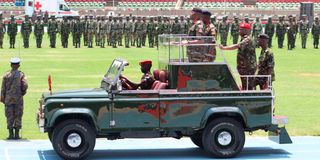Why today’s power handover will be a unique one

Kenya Defence Forces rehearse at Kasarani Stadium on September 12, 2022, ahead of President-elect William Ruto's inauguration.
It will make for an awkward moment at the Kasarani Stadium today when President Uhuru Kenyatta hands over the symbols of office to his successor William Ruto.
Kenya has had many hotly contested presidential elections, but never had the transition followed such a bitter, personalised duel capped by the outgoing president even refusing to acknowledge or congratulate the victor.
What makes this situation even odder is that this is not the case of President Kenyatta having to witness an opposition leader take the oath of office, but his own deputy of two terms, whom he chose to snub and instead back the presidential campaign of long-time rival and veteran opposition leader Raila Odinga.
Third handover
Today marks only the third handover of power since the return of multipartyism.
In 2002 President Daniel Moi turned up at Uhuru Park to hand over to Mwai Kibaki, who had handily defeated his young protégé, the selfsame Kenyatta.
It had been a hard-fought duel, but throughout the campaigns Kibaki and Moi had never exchanged insults.
While some in the Kibaki team had harsh words for Moi in relation to matters such as endemic corruption and human rights abuses, the candidate himself kept above the fray, preferring to sell his policies rather than launch tirades against either Moi or Uhuru.
As soon as the results were announced, President Moi was quick to recognise and acknowledge the change of guard, even personally urging Uhuru and his brigade, which included Ruto, to give an early concession.
Chaotic affair
The handover at Uhuru Park was a chaotic affair. Lack of coordination between the new and outgoing regimes saw an almost complete breakdown of security and protocol.
The dais was overcrowded and almost overrun by excited crowds. President Moi was greeted with jeers and an avalanche of mudballs as he made his entrance, but still managed to give a dignified speech acknowledging his successor and wishing him well.
In 2013, it was the turn of Kibaki to hand over to Uhuru. The run-up to the polls had seen some recriminations when key figures in the Kibaki State House and the security and administrative establishment sought to prevail upon Uhuru and his running mate, Ruto, to step down for Mr Musalia Mudavadi.
Stuck to their guns
The thinking at the time was that it would not be good for Kenya’s image and standing on the international front to be under leaders indicted by the International Criminal Court for crimes against humanity.
After initially wavering, Uhuru and Ruto stuck to their guns, in fact turning the ICC cases into potent political weapons.
From thereon President Kibaki did not interfere in the elections.
He kept well clear of the campaigns and though he did not publicly show his preference for either Mr Odinga or the UhuRuto duo, he was seen as having given his tacit blessings to the latter.
It was a smooth handover with no drama.
The run-up to today’s handover has already had more than its share of drama. From the time Dr Ruto was declared President-elect on August 15, President Kenyatta did not acknowledge his victory until after the Supreme Court upheld the election results on September 5.
Even then, it was a churlish speech in which the President notably refused to congratulate Dr Ruto or even acknowledge him by name, merely referring to “all those who won”.
The speech dwelt more on his disappointment with the Supreme Court verdict, but what it showed is Uhuru still harboured anger and bitterness that seemed to suggest he might even skip the swearing-in ceremony.
Uhuru has since affirmed that will be at Dr Ruto’s swearing in, where he will perform the ceremonial duty of handing over to his successor.
Little consequence
If Uhuru had chosen to skip the swearing-in event, like US President Donald Trump at President Joe Biden’s inauguration in 2020, it would be of little consequence as his role is basically ceremonial. The real ceremony will be conducted by the Chief Registrar of the Judiciary Ann Amadi overseen by Chief Justice Martha Koome.
The President will, of course, be invited to give a brief address, and it will be interesting what he says.
In a stadium packed to the rafters with Ruto supporters, it will also be interesting how President Kenyatta is received, especially as the Ruto campaign team is packed with individuals who love nothing better than to mock foes and pick fights, and might think nothing of orchestrating some catcalls and heckling.
Friendly greetings
If there were fears of awkward moments at Kasarani Stadium today as Uhuru hands over to Ruto, they were stilled when the two met at State House on the eve of the inauguration.
A video released by State House showed the President and First Lady Margaret Kenyatta receiving Dr Ruto and incoming First Lady Rachel with friendly greetings at the front steps before ushering them in.
Protocol
The protocol employed illustrated the new order, as the president hardly ever waits by the front door to receive a visitor, unless it is a Head of State or other similarly high-ranking foreign potentate.
President Kenyatta later gave a televised address repeating his desire for an orderly transition and also giving highlights of his two terms in office.





